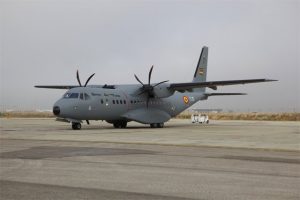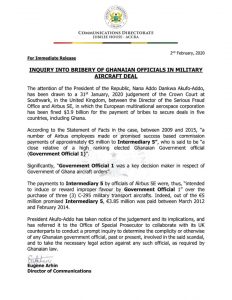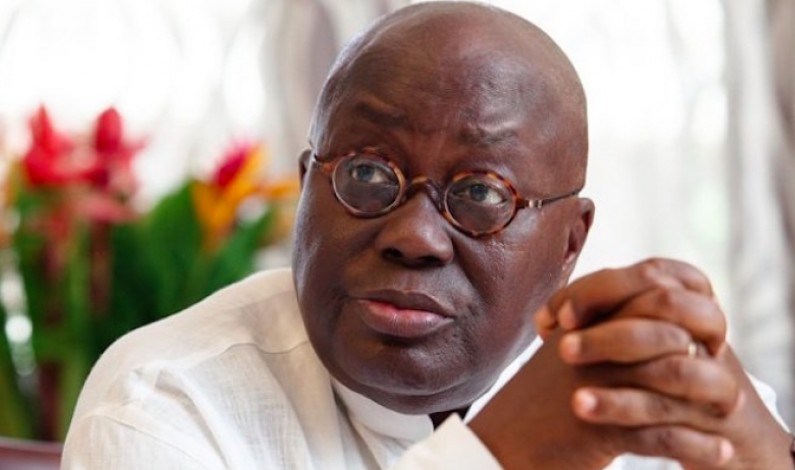The president has ordered investigations into allegations of bribery against former senior government officials under the late John Evans Atta-Mills and John Mahama administration.
In a statement signed by the Director of Communications, Eugene Arhin, the president Nana Akufo-Addo instructed the Office of the Special Prosecutor to liaise with their counterparts in the UK to investigate whether or not officials of government, past or present were complicit in what has become known as the Airbus bribery scandal.
The president also urged the Office of the Special prosecutor “to take the necessary legal action against any such official as required by Ghanaian law.”
Background
European aviation giant, Airbus, has admitted to paying huge sums in bribes in at least five countries, including Ghana to facilitate its business transaction.
The company in admitting to the offence paid close to £4 billion to a UK court to prevent any further investigations.
In court documents and hearings, Airbus admitted five counts of failing to prevent bribery, using a network of secret agents to pay large-scale backhanders to officials in foreign countries, including Ghana, to land high-value contracts.
The scheme was run by a unit at Airbus’ French headquarters, which its one-time chief executive, Tom Enders, reportedly called “bullshit castle”.
Read the full dossier on Ghana below

Airbus
The document alleges that contrary to section 7 of the UK’s Bribery Act 2010, Airbus failed to prevent persons associated with it from “bribing others concerned with the purchase of military transport aircraft by the Government of Ghana, where the said bribery was intended to obtain or retain business or advantage in the conduct of business.”
The judgment also states that between 2009 and 2015 an Airbus defence company engaged a close relative of a high-ranking elected Ghanaian Government official as an intermediary or agent in respect of the proposed sale of three military transport aircraft to the Government of Ghana.
“A number of Airbus employees knew that the intermediary was a close relative of Government Official 1, who was a key decision-maker in respect of the proposed sales. A number of Airbus employees made or promised success-based commission payments of approximately €5 million to Intermediary 5,” the judgment states and continues: “False documentation was created by or with the agreement of Airbus employees in order to support and disguise these payments. The payments were intended to induce or reward “improper favour” by Government Official 1 towards Airbus. Payments were eventually stopped due to the arrangement failing the due diligence processes required by the Liquidation Committee.”
The document also points out that: “Airbus, through one of its Spanish defence subsidiaries, conducted two campaigns to sell its C-295 military transport aircraft to the Government of Ghana: the first campaign ran from 2009 to 2011, the second from 2013 to 2015. Intermediary 5, a UK national with no prior expertise in the aerospace industry, acted as the BP for Airbus in both. Company D was the corporate vehicle through which Intermediary 5 and his associates provided services to Airbus.
His associates were Intermediaries 6 and 7, also UK nationals and there is no evidence they had any aerospace experience either. In August 2011, the purchase agreement for the sale of the two C-295 aircraft was signed by the Spanish defence subsidiary and the Government of Ghana, and it contained a declaration of compliance with the 1997 OECD Convention on Combating Bribery of Foreign Public Officials in International Business Transactions, as well as a declaration that no more than €3,001,718.15 would be paid to BPs in connection with the contract (broadly, a 5 per cent commission).
After Company D made a formal BP application to Airbus in May 2011, Airbus commissioned an external due diligence report. In September 2011 this report identified Intermediary 5 as a shareholder of Company D. The report raised the possibility that he was a close relative of Government Official 1 and concerns that there was a risk of non-compliance with the OECD Convention.”
The scandal has grabbed the headlines with many accusing the erstwhile NDC administration under John Mahama as corrupt.
But the office of the former president John Mahama has responded to the allegations and has denied any wrongdoing.

Airbus letter
Some of the countries involved in the scandal have begun investigations into the saga. On Sunday the president ordered investigations into the matter as well.







